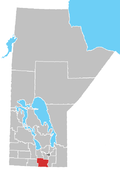This article needs additional citations for verification .(January 2011) |
Reinfeld is an Unincorporated Urban Community (UUC) in the Rural Municipality of Stanley in the Pembina Valley region of Manitoba, Canada, about one km east of Winkler. Mainly a Mennonite community, its relative vicinity to Winkler makes it a possible candidate to become a suburb in the future.
